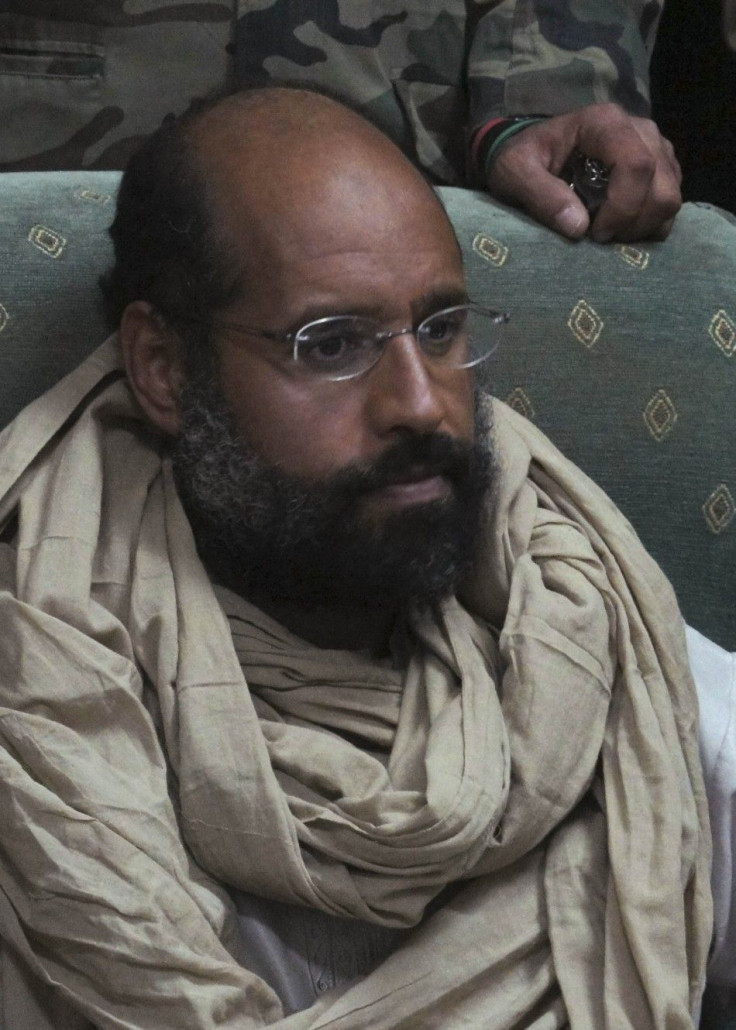ICC prosecutor happy for Libya to try Gaddafi son

The International Criminal Court's prosecutor said on Wednesday he was happy for Libya to try Muammar Gaddafi's son Saif al-Islam instead of sending him to the Hague, and cast doubt on whether the country's former intelligence chief had been caught.
Chief Prosecutor Luis Moreno-Ocampo said he hoped Saif al-Islam would get a fair trial if it is held in Libya, but the ICC's job was to ensure no defendant enjoyed impunity rather than to monitor the fairness of legal proceedings.
Moreno-Ocampo was in Tripoli for talks with officials after Saturday's capture of Saif al-Islam, whom the ICC indicted for crimes against humanity during Libya's civil war, along with Muammar Gaddafi and his intelligence chief Abdullah al-Senussi.
Human rights groups and some western leaders had called on Libya to hand over Saif al-Islam to the global court, saying Gaddafi's son might not get a fair trial in his home country.
But Moreno-Ocampo appeared to support the country's new leaders in their wish to try Saif al-Islam on Libyan soil.
Asked what standard Libya had to meet to try Saif al-Islam itself, Moreno-Ocampo said the ICC would step aside as long as genuine charges were brought.
My standard, the standard of the ICC, is that it has to be a judicial process that is not organised to shield the suspect. That's it, that's it, Moreno-Ocampo said, adding that Libya did not have to show that the trial would be completely fair.
I hope they do a fair trial. My point is that we are not a system to monitor fair trials. We are a system to ensure no impunity, he said.
Later, he told Reuters: I don't think they are trying to shield Saif al-Islam Gaddafi here. I have no evidence of that.
The ICC, which is based in the Hague, is a court of last resort and steps in only when there is no genuine national legal system to prosecute a suspect.
Libyan officials have been adamant that their country's courts can give Saif al-Islam a fair trial despite concerns about the solidity of Libya's institutions after 42 years of dictatorship and a bloody civil war.
A legal expert at New York-based campaign group Human Rights Watch said it was up to the ICC's judges, not Moreno-Ocampo, to decide if Saif al-Islam should be handed over to the Hague.
At the end of the day, this is not a prosecutorial decision, this is a judicial decision made by the ICC judges, said Richard Dicker.
What the judges will look at is the ability and the willingness to conduct a trial in Libya, and they will make their decision based on those two standards.
Moreno-Ocampo also fanned doubts surrounding the reported capture of Senussi, who used to head Gaddafi's widely feared secret police.
National Transitional Council (NTC) officials said on Sunday that Senussi had been caught the day after Saif al-Islam, and in the same southern desert region.
The prime minister-designate, Abdurrahim El-Keib, later said he needed to verify whether Senussi had indeed been seized before being able to confirm it. Since then the NTC has neither confirmed nor denied the capture, even though a military commander has stood by his report that Senussi had been caught.
I understand he has not been arrested, Moreno-Ocampo told Reuters in an interview after his news conference, adding: I have no better information than you.
Charges have not yet been brought in Libya against Saif al-Islam, who is being held in the Western Mountains town of Zintan by the fighters who found him in the desert and then flew him to their stronghold.
If he is tried in Libya, he could face the death penalty. The harshest sentence the ICC can impose is life in prison.
PROTECTIVE CUSTODY
The Zintan fighters who captured Saif al-Islam have said they are keeping him in their custody for his protection after Muammar Gaddafi was killed following his capture by a different militia in his hometown of Sirte.
They have said they will hand him over after a national government is formed. The new cabinet was announced on Tuesday, though its members have not yet been sworn in.
The provisional government faces a vast task in guiding the country towards democracy, with elections to a constituent assembly due in the middle of next year.
Moreno-Ocampo said he understood the importance of holding Saif al-Islam's trial in Libya as the country emerges from Gaddafi's long rule and the bloodshed involved in ending it.
The point is that for Libya, and I respect that, it is very important to do the cases in Libya. This is a right and I have nothing to say. I'm not competing for the case, he said.
Murder is murder, prosecution is a prosecution, I hope the Libyans can find a way to do it but that's why we're discussing modalities. Maybe for a few months, for some months, we'll keep working together.
© Copyright Thomson Reuters 2024. All rights reserved.











